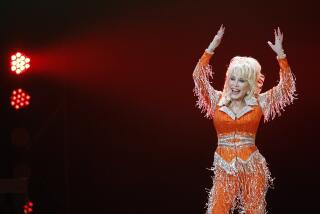More ‘Party Classics’ Dug Up From Down in New Orleans
- Share via
Rhino Records has already released almost a dozen albums featuring vintage New Orleans R&B; and rock recordings. So it’s hard to imagine that there are enough appealing numbers left for still another collection.
Yet “New Orleans Party Classics” is arguably as inviting as any of the label’s earlier Crescent City retrospectives.
While the emphasis is on material from the ‘50s and ‘60s, the 18 selections include some tracks recorded in the ‘80s and one from 1991. That new track, the Rebirth Brass Band’s “Do Whatcha Wanna --Part 3,” is a reminder that the New Orleans sound is very much alive.
The other material ranges from two selections by recent Rock and Roll Hall of Fame inductee Professor Longhair to one by longtime Hall of Fame member Fats Domino, as well as such additional tracks as Huey (Piano) Smith’s “Don’t You Just Know It,” Frankie Ford’s “Sea Cruise,” Dr. John’s “Iko Iko” and the Neville Brothers’ “Hey Pocky Way.”
What is it about the New Orleans sound that makes it so enduring?
“The music has an extremely festive quality to it that makes you want to dance and have a good time,” said James Austin, who compiled the album with Joe Sasfy. “One of the strengths of the sound is its ability to weave together various musical elements.
“The music may be based in R&B;, but you can find traces of everything from rumba and country music to jazz and blues. This melting-pot process has given the music a unique, yet universal flavor.”
Another new retrospective from Rhino is the equally appealing “Risque Rhythm/Nasty ‘50s R&B.;” The 18 songs--ranging from such risque classics as the Dominoes’ “Sixty-Minute Man” to Hank Ballard’s “Work With Me Annie” --helped set a tone in the ‘50s for the sexy undercurrents of early rock ‘n’ roll.
Measured against the blatant nature of recordings today by such rap groups as 2 Live Crew, the old singles seem almost innocent. While young rock and R&B; fans of the day could interpret the lyrics as having sexual undertones, the language was always cloaked in double-entendre--often terms that could be viewed as dance expressions.
“Work With Me Annie,” for instance, was probably the most successful--and notorious--of all the risque records in the ‘50s. The single caused such a stir that it spent seven weeks at No. 1 on the R&B; charts in 1954 and led to an answer record by Etta James. Her record, “Roll With Me Henry,” topped the R&B; charts for four weeks in 1955. Both could be explained as invitations to dance . . . “Dance With Me Annie” or “Dance With Me Henry.”
In fact, Georgia Gibbs changed the title to “Dance With Me Henry” when she recorded a hit pop version of the James song in 1955. But Ballard wasn’t intimidated by the furor over the lyrics. After the success of “Work With Me Annie,” he came back with another hit . . . “Annie Had a Baby.”
More to Read
The biggest entertainment stories
Get our big stories about Hollywood, film, television, music, arts, culture and more right in your inbox as soon as they publish.
You may occasionally receive promotional content from the Los Angeles Times.










